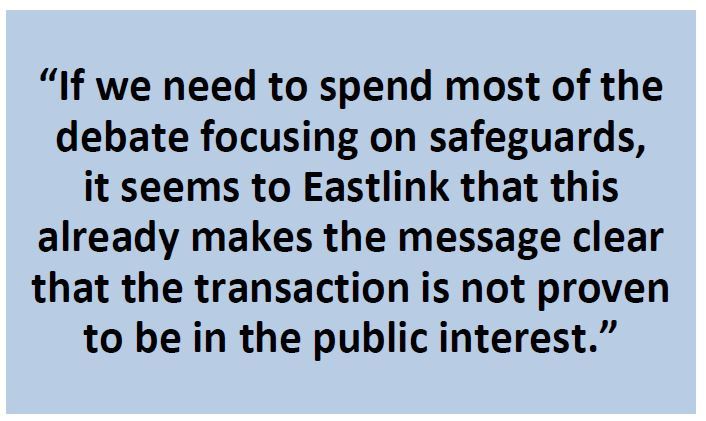
GATINEAU – In their final written submissions to the CRTC on the proposed purchase of Astral Media by Bell Canada, various interveners say there are no words, no new rules the Commission can write which will sufficiently protect the Canadian TV system from the market power of a combined Bell/Astral.
That, tied to the fact Bell has told the Commission in no uncertain terms it will not proceed with the merger should it be required to divest any other assets, means the whole deal should be denied, just like the first one was rejected last fall. (Check out our coverage of the oral hearing last week.)
“It is apparent that the only structural measure that could be implemented is to deny the Astral Application in its entirety,” reads the Cogeco submission.
Says Eastlink: “Eastlink believes that the record of this proceeding includes very little evidence of benefits flowing from this transaction, but rather, there are numerous causes for concern by approving this transaction. If we need to spend most of the debate focusing on safeguards, it seems to Eastlink that this already makes the message clear that the transaction is not proven to be in the public interest. There are already problems with the existing regime because the system has already allowed the largest communications company in the country to control essential content over which its direct competitors rely for their business. Bell should not be allowed to grow larger.”
Indeed, the interveners spent much of their final submissions noting any new safeguards would simply not work or add further delay and complexity to a regulatory system that’s already too confusing and slow when it comes to dispute resolution. Besides, says the Canadian Cable Systems Alliance, writing new, airtight rules that would work in the way the Commission hopes (that it see fewer disputes brought before it) seem unattainable. “With respect to precision of drafting, we note the near-impossibility of drafting conditions that contain no loopholes,” writes the CCSA.
The Alliance proposed something quite interesting, however: the open publishing of wholesale rates paid to broadcasters by Canadian BDUs as a way to make sure those fees charged are reasonable. “Transparency is vital. The introduction of transparency as to rates and terms of carriage would bring an entirely different type of remedy into play; the powerful element of consumer scrutiny,” says the CCSA submission.
“The way to put Canadian consumers at the center of their broadcasting system is to increase their visibility into it. Canadians should be able to see what they are buying and why they pay the prices they do,” it adds, cleverly using CRTC chairman’s Jean-Pierre Blais’s own words when he took the job – of making the Canadian consumer central to what the CRTC does.

In the reply phase of the hearing, that is, last Friday when Bell got a chance to respond orally to the various interveners, chairman Blais introduced a new idea where the Commission would have to approve every wholesale carriage agreement between Bell and other companies for TV channels. It’s a new idea where, once explained, Bell executives agreed to. Not surprisingly, the interveners don’t believe that will solve anything.
“Specifically, it would not ensure that content for new nonlinear platforms would be made available to third party distributors on commercially reasonable terms,” reads the Rogers submission, which still says forcing Bell/Astral to divest TMN and TMN Encore is the best option. “Nor would it address our concerns relating to the use of a less than perfect mechanism like final offer arbitration to set rates instead of relying on a properly functioning market to establish those rates. Finally, it is not clear that the proposed safeguard would adequately respond to the concerns about timeliness of access to premium content and Bell Media’s ability to obtain a competitive advantage for its affiliated distributors.”
As well, the written undertaking by Bell – which commissioners asked Bell to produce at the oral hearing – which turns parts of the Vertical Integration code of conduct into real conditions of license for the company was also panned by the interveners.
“The conditions of licence safeguards proposed at the oral hearing will not sufficiently address the negative competitive impacts of allowing a large vertically integrated player to gain more assets and further concentrate broadcasting submarkets in Canada,” writes the Public Interest Advocacy Centre and the various other groups it represents.
Besides, adds Telus, Bell is not being forthright in its checkered history of past dealings with other companies and is attempting “to gloss over past improper conduct in relation to providing access to its content to other distributors and carriers,” it says. While Bell executives noted Friday that it had never done anything untoward during negotiations, Telus disagreed. “Bell’s past behaviour and its incentives for future behaviour are what is at issue in this hearing and further underscore the need for clear and enforceable rules in the event that the Commission deems it appropriate to approve Bell’s acquisition of Astral.”
For Cogeco, Eastlink, the CCSA and PIAC, however, full denial of the deal is the only option (Rogers, too, for that matter. Since Bell has said it will scuttle the deal rather than accept more divestitures, Rogers finds itself alongside the others).
“Cogeco is prepared to discuss in more detail proposals for improving the current dispute resolution and FOA mechanisms as part of a future regulatory policy review,” says its submission. However, “the most appropriate forum for exploring the proposed ex ante process and other potential revisions to the regulatory framework would be in the context of such a fulsome proceeding to review the regulatory framework. This would involve issues and drafting that may require some time to resolve.
“In the interim, the Commission should not exacerbate the structural problems that already exist by approving BCE’s proposal to increase its market power through acquiring Astral.”
Bell's final written reply is due May 21st.



